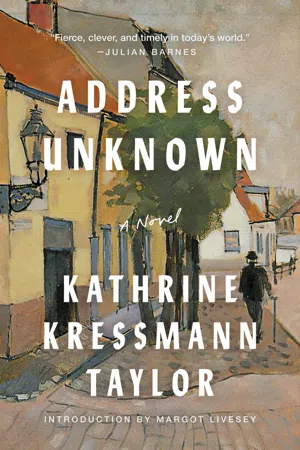
- 96 pages
- English
- ePUB (mobile friendly)
- Available on iOS & Android
About this book
A rediscovered classic and international bestseller that recounts the gripping tale of a friendship destroyed at the hands of Nazi Germany
In this searing epistolary novel, Kathrine Kressmann Taylor brings vividly to life the insidious spread of Nazism through a series of letters between Max, a Jewish art dealer in San Francisco, and Martin, his friend and former business partner who has returned to Germany in 1932, just as Hitler is coming to power.
Originally published in Story magazine in 1938, Address Unknown became an international sensation. Credited with exposing the dangers of Nazism to American readers early on, it is also a scathing indictment of fascist movements around the world and a harrowing exposé of the power of the pen as a weapon.
A powerful and eloquent tale about the consequences of a friendship—and society—poisoned by extremism, Address Unknown remains hauntingly and painfully relevant today.
Tools to learn more effectively

Saving Books

Keyword Search

Annotating Text

Listen to it instead
Information
Afterword
Table of contents
- Cover
- Title Page
- Contents
- Introduction
- Schulse-Eisenstein Galleries
- Schloss Rantzenburg
- Schulse-Eisenstein Galleries
- Schloss Rantzenburg
- Schulse-Eisenstein Galleries
- Deutsch-Bölkische Bank und Handelsgesellschaft
- Schulse-Eisenstein Galleries
- Deutsch-Bölkische Bank und Handelsgesellschaft
- Eisenstein Galleries
- Eisenstein Galleries
- Eisenstein Galleries
- Deutsch-Bölkische Bank und Handelsgesellschaft
- Cablegram
- Eisenstein Galleries
- Eisenstein Galleries
- Eisenstein Galleries
- Schloss Rantzenburg
- Eisenstein Galleries
- Eisenstein Galleries
- Afterword
- About the Author
- Also by Kathrine Kressmann Taylor
- Copyright
- About the Publisher
Frequently asked questions
- Essential is ideal for learners and professionals who enjoy exploring a wide range of subjects. Access the Essential Library with 800,000+ trusted titles and best-sellers across business, personal growth, and the humanities. Includes unlimited reading time and Standard Read Aloud voice.
- Complete: Perfect for advanced learners and researchers needing full, unrestricted access. Unlock 1.4M+ books across hundreds of subjects, including academic and specialized titles. The Complete Plan also includes advanced features like Premium Read Aloud and Research Assistant.
Please note we cannot support devices running on iOS 13 and Android 7 or earlier. Learn more about using the app